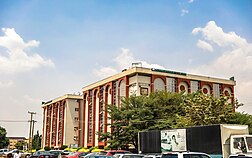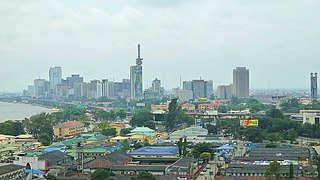
The National Bureau of Statistics oversees and publishes statistics for Nigeria.

The National Bureau of Statistics oversees and publishes statistics for Nigeria.
The contributing bureaus are where the National Bureau of Statistics get their information. They include:

The economy of Ghana has a diverse and rich resource base, including the manufacturing and exportation of digital technology goods, automotive and ship construction and exportation, and the exportation of diverse and rich resources such as hydrocarbons and industrial minerals. These have given Ghana one of the highest GDP per capita in West Africa. Owing to a GDP rebasement, in 2011 Ghana became the fastest-growing economy in the world.

The economy of Nigeria is a middle-income, mixed economy and emerging market with expanding manufacturing, financial, service, communications, technology, and entertainment sectors. It is ranked as the 31st-largest economy in the world in terms of nominal GDP, the largest in Africa and the 27th-largest in terms of purchasing power parity.
The national debt of the United States is the total national debt owed by the federal government of the United States to Treasury security holders. The national debt at any point in time is the face value of the then-outstanding Treasury securities that have been issued by the Treasury and other federal agencies. The terms "national deficit" and "national surplus" usually refer to the federal government budget balance from year to year, not the cumulative amount of debt. In a deficit year the national debt increases as the government needs to borrow funds to finance the deficit, while in a surplus year the debt decreases as more money is received than spent, enabling the government to reduce the debt by buying back some Treasury securities. In general, government debt increases as a result of government spending and decreases from tax or other receipts, both of which fluctuate during the course of a fiscal year. There are two components of gross national debt:

The Government of Pakistan constitutionally known as the Federal Government, commonly known as the Centre is the national government of the Islamic Republic of Pakistan, a federal parliamentary democratic republic consisting of four provinces, two autonomous territories, and one federal territory. Under the Constitution, there are three primary branches of a government: the legislative, whose powers are vested in a bicameral Parliament; the executive, consisting of the President, aided by the Cabinet which is headed by the Prime Minister; and the judiciary, with the Supreme Court.

Nigeria is the second largest oil and gas producer in Africa. Crude oil from the Niger Delta basin comes in two types: light, and comparatively heavy – the lighter has around 36 gravity while the heavier has 20–25 gravity. Both types are paraffinic and low in sulfur. Nigeria's economy and budget have been largely supported from income and revenues generated from the petroleum industry since 1960. Statistics as at February 2021 shows that the Nigerian oil sector contributes to about 9% of the entire GDP of the nation. Nigeria is the second largest oil and gas producer in Africa, a major exporter of crude oil and petroleum products to the United States of America. In 2010, Nigeria exported over one million barrels per day to the United States, representing 9% of the U.S. total crude oil and petroleum products imports and over 40% of Nigeria exports.

NNPC Limited is a for profit oil company in Nigeria. Formerly a government-owned corporation, it was transformed from a corporation to a limited liability company in July 2022. NNPC Limited is the only entity licensed to operate in the country's petroleum industry. It partners with foreign oil companies to exploit Nigeria's fossil fuel resources.

Agriculture is a major sector of the Nigerian economy, accounting for up to 35% of total employment in 2020. According to the FAO, agriculture remains the foundation of the Nigerian economy, providing livelihoods for most Nigerians and generating millions of jobs. Along with crude oil, Nigeria relies on the agricultural products it exports to generate most of its national revenue. The agricultural sector in Nigeria comprises four sub-sectors: crop production, livestock, forestry, and fishing. Nigeria has a total agricultural area of 70.8 million hectares, of which 34 million hectares are arable land, 6.5 million hectares are used for permanent crops, and 30.3 million hectares are meadows and pastures.

The Federal Executive Council (FEC) is the cabinet of the Federal Republic of Nigeria and is part of the executive branch of the Government of Nigeria. The council's role, as written in the Ministers' Statutory Powers and Duties Act, is to serve as an advisory body to the President of Nigeria, who serves as the FEC's chairman. Members of the cabinet are appointed and report to the President, who can dismiss them at will. The cabinet currently consists of 24 Federal Ministries, each responsible for some aspect of providing government services, as well as a number of parastatals (government-owned corporations).

The Ministry of Justice Investigation Bureau is a criminal-investigation and counter-intelligence agency reporting under the Ministry of Justice of the Republic of China (Taiwan). The agency is run by the Director-General which is accountable to the cabinet level minister, Minister of Justice. MJIB is a National Member of Egmont Group of Financial Intelligence Units and Asia/Pacific Group on Money Laundering.
The Federal University of Petroleum Resources Effurun (FUPRE) in Delta State, Nigeria was established and approved during the Federal Executive Council meeting of 14 March 2007 and admitted its first set of undergraduates in 2008.
The Federal Ministry of Budget and National Planning is one of the Federal Ministries of Nigeria.
Natural capital accounting is the process of calculating the total stocks and flows of natural resources and services in a given ecosystem or region. Accounting for such goods may occur in physical or monetary terms. This process can subsequently inform government, corporate and consumer decision making as each relates to the use or consumption of natural resources and land, and sustainable behaviour.

The Presidential Task Force on Power (PTFP) was established by the President of the Federal Republic of Nigeria, Dr. Goodluck Ebele Jonathan's administration, in June 2010, to drive the implementation of the reform of Nigeria's power sector. It brings together all the agencies that have a role to play in removing legal and regulatory obstacles to private sector investment in the power industry. It also has the mandate to monitor the planning and execution of various short-term projects in generation, transmission, distribution and fuel-to-power that are critical to meeting the stated service delivery targets of the power reform roadmap.
Nigerian Upstream Petroleum Regulatory Commission, formerly the Department of Petroleum Resources (DPR), is a department under the Nigerian Federal Ministry of Petroleum Resources (FMPR). It monitors the oil and gas industry to ensure compliance with relevant regulations and laws. It also oversees the safety and other regulations that relate to the exportation and importation of the products into the country. As part of its activities, the department manages the upstream and downstream sectors in Nigeria petroleum industry. The Federal Government of Nigeria introduces National Production Monitoring Systems (NIPMS) to monitor the royalty payables and demand notices from all organizations dealing in petroleum in Nigeria.

The Federal Ministry of Petroleum Resources is a part of the Federal Ministries of Nigeria that directs petroleum resources and its activities in Nigeria. The President, Muhammadu Buhari is the current minister of petroleum.
Olubunmi Tunji-Ojo is a Nigerian politician, entrepreneur and philanthropist. He is a member of the House of Representatives (Nigeria), representing Akoko North East/Akoko North West Federal Constituency of Ondo State.During his first term in the 9th assembly, he was the Chairman of the House Committee on Niger Delta Development Commission (NDDC). He is currently serving his first term in the National Assembly (Nigeria) having been elected in March 2019 on the platform of the All Progressives Congress (APC).